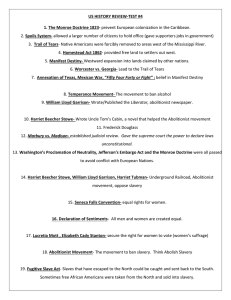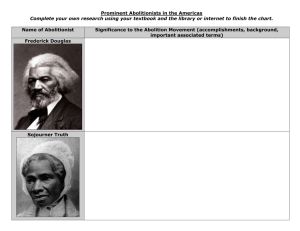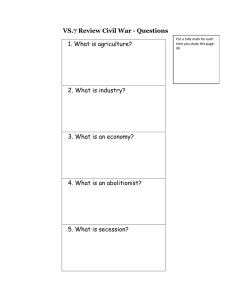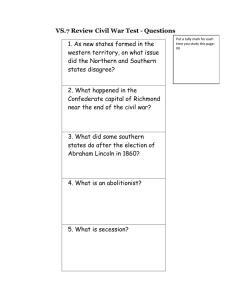PrepUS History Name: ____________________ Date: _______________
advertisement
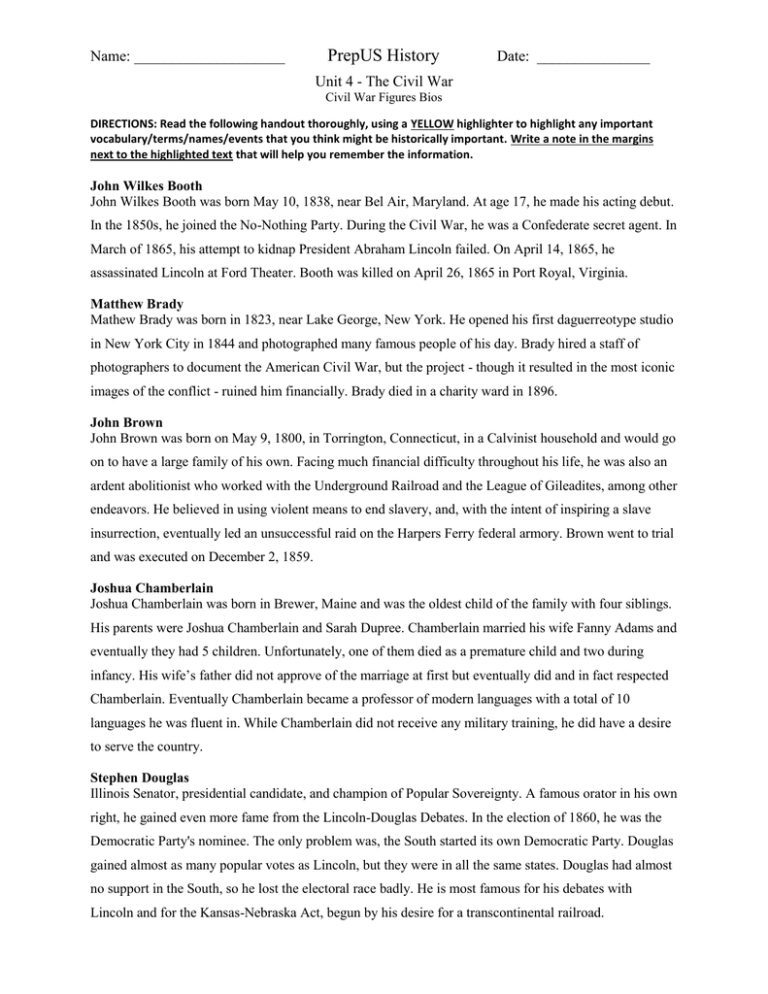
Name: ____________________ PrepUS History Date: _______________ Unit 4 - The Civil War Civil War Figures Bios DIRECTIONS: Read the following handout thoroughly, using a YELLOW highlighter to highlight any important vocabulary/terms/names/events that you think might be historically important. Write a note in the margins next to the highlighted text that will help you remember the information. John Wilkes Booth John Wilkes Booth was born May 10, 1838, near Bel Air, Maryland. At age 17, he made his acting debut. In the 1850s, he joined the No-Nothing Party. During the Civil War, he was a Confederate secret agent. In March of 1865, his attempt to kidnap President Abraham Lincoln failed. On April 14, 1865, he assassinated Lincoln at Ford Theater. Booth was killed on April 26, 1865 in Port Royal, Virginia. Matthew Brady Mathew Brady was born in 1823, near Lake George, New York. He opened his first daguerreotype studio in New York City in 1844 and photographed many famous people of his day. Brady hired a staff of photographers to document the American Civil War, but the project - though it resulted in the most iconic images of the conflict - ruined him financially. Brady died in a charity ward in 1896. John Brown John Brown was born on May 9, 1800, in Torrington, Connecticut, in a Calvinist household and would go on to have a large family of his own. Facing much financial difficulty throughout his life, he was also an ardent abolitionist who worked with the Underground Railroad and the League of Gileadites, among other endeavors. He believed in using violent means to end slavery, and, with the intent of inspiring a slave insurrection, eventually led an unsuccessful raid on the Harpers Ferry federal armory. Brown went to trial and was executed on December 2, 1859. Joshua Chamberlain Joshua Chamberlain was born in Brewer, Maine and was the oldest child of the family with four siblings. His parents were Joshua Chamberlain and Sarah Dupree. Chamberlain married his wife Fanny Adams and eventually they had 5 children. Unfortunately, one of them died as a premature child and two during infancy. His wife’s father did not approve of the marriage at first but eventually did and in fact respected Chamberlain. Eventually Chamberlain became a professor of modern languages with a total of 10 languages he was fluent in. While Chamberlain did not receive any military training, he did have a desire to serve the country. Stephen Douglas Illinois Senator, presidential candidate, and champion of Popular Sovereignty. A famous orator in his own right, he gained even more fame from the Lincoln-Douglas Debates. In the election of 1860, he was the Democratic Party's nominee. The only problem was, the South started its own Democratic Party. Douglas gained almost as many popular votes as Lincoln, but they were in all the same states. Douglas had almost no support in the South, so he lost the electoral race badly. He is most famous for his debates with Lincoln and for the Kansas-Nebraska Act, begun by his desire for a transcontinental railroad. Frederick Douglass Abolitionist leader Frederick Douglass was born into slavery in Talbot County, Maryland. He became one of the most famous intellectuals of his time, advising presidents and lecturing to thousands on a range of causes, including women’s rights and Irish home rule. Among Douglass’ writings are several autobiographies eloquently describing his experiences in slavery and his life after the Civil War. Nathan Bedford Forrest Born July 13, 1821, in Tennessee, Nathan Bedford Forrest was a self-taught man who made his fortune as a cotton planter and slave trader. At the outbreak of the Civil War, he raised a cavalry and fought with distinction through much of the war. Controversy surrounds his degree of responsibility at the Battle of Ft. Pillow, where nearly 300 surrendering black soldiers were slaughtered. After the war, he was a businessman and founding member of the Ku Klux Klan. He died in 1877 in Memphis at the age of 56. William Lloyd Garrison William Lloyd Garrison was born December 10, 1805 in Newburyport, Massachusetts. In 1830 he started an abolitionist paper, The Liberator. In 1832 he helped form the New England Antislavery Society. When the Civil War broke out, he continued to blast the Constitution as a pro-slavery document. When the civil war ended, he at last saw the abolition of slavery. He died May 24, 1879 in New York City. Ulysses S. Grant Ulysses S. Grant was born on April 27, 1822, in Point Pleasant, Ohio. He was entrusted with command of all U.S. armies in 1864, and relentlessly pursued the enemy during the Civil War. In 1869, at age 46, Grant became the youngest president theretofore. Though Grant was highly scrupulous, his administration was tainted with scandal. After leaving the presidency, he commissioned Mark Twain to publish his bestselling memoirs. Oliver Otis Howard Born in Leeds, Maine on November 8, 1830, Oliver Otis Howard served on the Union side in American Civil War. After the war ended, President Andrew Johnson appointed him commissioner of the Freedmen’s Bureau to help former slaves. The bureau created schools, arranged medical aid and negotiated work contacts. He helped found Howard University where he served as president for several years. He died in 1909. Harriet Jacobs Born in North Carolina in 1813, Harriet Ann Jacobs escaped slavery and moved to New York where she wrote the powerful autobiography, Incidents in the Life of a Slave Girl. The powerful and comprehensive slave narrative became one of the most influential books of the period. Robert E. Lee Born on January 19, 1807 in Stratford, Virginia, Robert E. Lee came to military prominence during the U.S. Civil War, commanding his home state's armed forces and becoming general-in-chief of the Confederate forces towards the end of the conflict. Though the Union won the war, Lee has been revered by many while others debate his tactics. He went on to become president of Washington College. 2 Abraham Lincoln Abraham Lincoln is regarded as one of America's greatest heroes due to both his incredible impact on the nation and his unique appeal. His is a remarkable story of the rise from humble beginnings to achieve the highest office in the land; then, a sudden and tragic death at a time when his country needed him most to complete the great task remaining before the nation. Lincoln's distinctively human and humane personality and historical role as savior of the Union and emancipator of the slaves creates a legacy that endures. His eloquence of democracy and his insistence that the Union was worth saving embody the ideals of self-government that all nations strive to achieve. Solomon Northup Born in July 1808 in Minerva, New York, Solomon Northup grew up a free man, working as a farmer and violinist while having a family. He was lured south and kidnapped in 1841 and enslaved for more than a decade, enduring horribly violent conditions. Northup was freed in 1853 with help from colleagues and friends. His experiences are the subject of the book and film 12 Years a Slave. Allan Pinkerton Born on August 25, 1819, in Glasgow, Scotland, Allan Pinkerton was the founder of a famous American detective agency. Pinkerton's agency stopped a plot aimed at president-elect Abraham Lincoln and, working for the Union during the Civil War, he headed an group whose purpose was to obtain military information in the Southern states. After he retired, he wrote three books about his experiences. Homer Plessy Born on March 17, 1862, in New Orleans, Louisiana, Homer Plessy was a shoemaker whose one act of civil disobedience helped inspire future generations of the Civil Rights Movement. He challenged Louisiana segregation legislation by refusing to move from a “whites only” railcar in 1896. His case was heard before the U.S. Supreme Court and arguments from it were used decades later in the landmark Brown v. Board of Education decision of 1954. Plessy passed away March 1, 1925, at age 61. Dred Scott Dred Scott was born into slavery sometime in 1795, in Southampton County, Virginia. He made history by launching a legal battle to gain his freedom. After his first owner died, Scott spent time in two free states and shortly after he married he tried to buy freedom for himself and his family but failed. He took his case to the Missouri courts where he won only to have the decision overturned by the Supreme Court, an extremely controversial event that contributed to the outbreak of the Civil War. Scott died in 1858. Robert Gould Shaw Robert Gould Shaw was an American soldier in the Union Army during the U.S. Civil War. Born into a prominent abolitionist family, he accepted command of the first all-black regiment (54th Massachusetts) and encouraged the men to refuse their pay until it was equal to the white troops’ wage. At the Second Battle of Fort Wagner, SC, Shaw was killed while leading his men to the parapet of the enemy fort. Although they were overwhelmed and driven back, Shaw’s leadership passed into legend with a unit that inspired tens of thousands more African-Americans to enlist for the Union and contribute its ultimate victory. Shaw's story was dramatized in the 1989 film Glory, starring Matthew Broderick. 3 William T. Sherman William Tecumseh Sherman's early military career was a near disaster, having to be temporarily relieved of command. He returned at the Battle of Shiloh to victory and then gathered 100,000 troops destroying Atlanta and devastating Georgia in his March to the Sea. Often credited with the saying, “war is hell,” he was a major architect of modern total war. Harriet Beecher Stowe Harriet Beecher Stowe was born on June 14, 1811, in Litchfield, Connecticut. Her father, Lyman Beecher, was a leading Congregationalist minister and the patriarch of a family committed to social justice. Stowe achieved national fame for her anti-slavery novel, Uncle Tom’s Cabin, which fanned the flames of sectionalism before the Civil War. Stowe died in Hartford, Connecticut, on July 1, 1896. Charles Sumner Charles Sumner was a U.S. Representative born on January 6, 1811, in Boston, Massachusetts. Elected to the U.S. Senate in 1852, Sumner supported abolition. After the Civil War, Sumner joined the Radical Republicans who believed the South should be punished. During his 20 year career, Sumner most notably authored the nation’s first civil rights legislation in 1866. The anti-slavery advocate died on March 11, 1874, in Washington D.C. Sojourner Truth Born in New York circa 1797, Sojourner Truth was the self-given name, from 1843 onward, of Isabella Baumfree, an African-American abolitionist and women's rights activist. Truth was born into slavery in Swartekill, New York, but escaped with her infant daughter to freedom in 1826. Her best-known speech on racial inequalities, “Ain't I a Woman?” was delivered extemporaneously in 1851 at the Ohio Women's Rights Convention. Harriet Tubman Harriet Tubman was an American bondwoman who escaped from slavery in the South to become a leading abolitionist before the American Civil War. She was born in Maryland in 1820, and successfully escaped in 1849. Yet she returned many times to rescue both family members and non-relatives from the plantation system. She led hundreds to freedom in the North as the most famous “conductor” on the Underground Railroad, an elaborate secret network of safe houses organized for that purpose. Mary Walker Mary Walker was born on November 26, 1832, in Oswego, New York. She graduated from Syracuse Medical College and, while serving as an assistant surgeon during the Civil War, was captured by the Confederate army. She was awarded a Medal of Honor for her service, and went on to lecture on women's rights, dress reform and suffrage. Walker died in Oswego in 1919. 4
